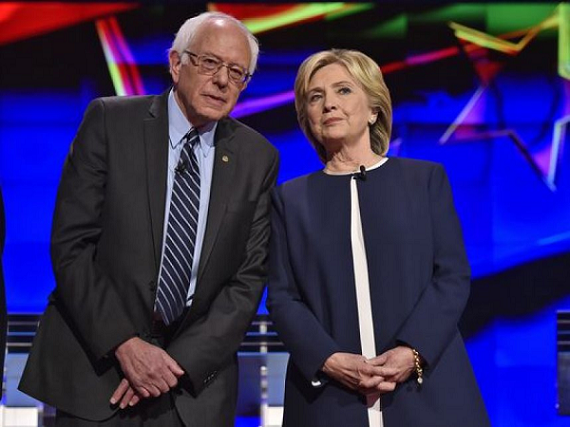
The latest brouhaha going on right now is between Apple CEO Tim Cook and the FBI over whether or not the company will allow the government to have access to the iPhone of one of the killers in the San Bernardino shootings last year. The government wants access, and Apple won’t give it to them.
The issue goes beyond tech, of course. There are major implications in what happens here, regarding both citizen’s right to privacy, as well as our national security. So, naturally, especially since this is an election year, it has become a political issue as well.
On Thursday night, MSNBC held a townhall style debate with Hillary Clinton and Bernie Sanders, and both of them were asked, separately, their thoughts on the issue. Unlike many on the other side of the aisle, neither candidate would condemn Apple for its stance, instead choosing a middle ground on the issue.
Sanders was asked first what he thought of the issue, he called it “complicated.”
“I am very fearful in America about Big Brother,” Sanders said, meaning the government being able to read people’s e-mails, and get their health record. “On the other hand, what I also worry about, is the possibility of another terrorist attack against our country.”
The Senator called for “middle ground” that he believes can be reached by the two sides.
“I think there has got to be a balance.”
When Clinton was asked the same question, she took a very similar stance, calling it “one of the most difficult dilemmas that we’re faced with.”
“Law enforcement has every reason to want to get information off of a killer’s cell phone, she said, while also capitulating that Apple, too, has a strong reason for staking its position on this.
“Apple, understandably, is worried about opening the door, creating what they call a “back door,” into encryption, that would not just have to field requests from the United States government, but from the Chinese, Russian, Iranian governments
Instead of taking one side over the other, Clinton called for the government and the tech industry work together, in order “to figure out what is the path forward.”
“I see both sides,” she said. “We don’t want privacy and encryption destroyed, and we want to catch, and make sure there’s nobody else out, who’s information is on that cellphone of the killer.”
This stance, of government and tech companies working together to stop terrorism, is the same argument Clinton made regarding social media’s role in the fight against groups like ISIS.
“They are using websites, social media, chat rooms and other platforms to celebrate beheadings, recruit future terrorists and call for attacks. We should work with host companies to shut them down,” Clinton saidin a speech in December, calling for dialogue between governments around the word and the tech community to “confront this problem together.
“We’re going to have more support from our friends in the technology world to deny online space.”
Silicon Valley’s stance
While the politicians are weighing both sides, or at least the Democrats are, many of Apple’s fellow techcompanies, including some of its biggest rivals, have come out on its side on this issue.
Google CEO Sundar Pichai wrote on Twitter that if Apple were to comply it “could be a troublingprecedent.
4/5 But that’s wholly different than requiring companies to enable hacking of customerdevices & data. Could be a troubling precedent
— sundarpichai (@sundarpichai) February 17, 2016
Twitter CEO Jack Dorsey also Tweeted his support for Apple and Cook.
We stand with @tim_cook and Apple (and thank him for his leadership)!https://t.co/XrnGC9seZ4
— Jack (@jack) February 18, 2016
“These demands would create a chilling precedent and obstruct companies’ efforts to secure theirproducts,” Facebook said in a statement to USA Today.
















